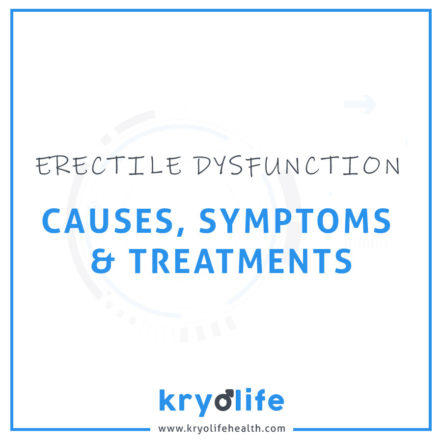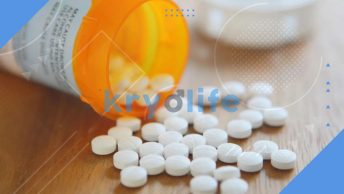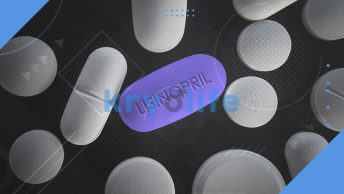Quick summary
- Erectile dysfunction (ED) is a prevalent physiological condition affecting millions of men worldwide, with a higher prevalence in older age groups.
- ED can have various causes, including lifestyle-associated disorders, stress, anxiety, alcohol, medications, and unhealthy diets.
- Treatments for ED are diverse and include medications, alprostadil urethral suppositories, vacuum penis pumps, testosterone replacement therapy, and testosterone supplements.
Erectile dysfunction (ED)1 is a prevalent and serious physiological condition that affect millions of males around the globe.
They have a prevalence rate of 52 percent according to a report by the Massachusetts Male Aging Study.
ED is an age-related disorder and becomes more severe as a person grows older, but it starts as early as at the age of 40.
However, there are also reports of ED in young adults of the age category 20 ~40 caused by physiological disorders like multiple sclerosis, peripheral arterial disease (PAD), etc.
Numbers say that a male at his 40’s is at a 40% higher risk of experiencing some level of erectile dysfunction, but a risk of complete ED is just 5%.
However, as they age goes higher, a 70-year-old man will have 70% more chances of having ED with just a 15% risk of complete ED.
In this article, we are going to discover everything about erectile dysfunction that you must know like it’s causes, symptoms, diagnostic approach and possible treatment so that you will have a chance to prevent it in future.
Let’s wind the intro about ED and quickly move on the topic.
Read more: 10 Tips On How To Make Your Erection Stronger
What is ‘Erectile Dysfunction?’

Erectile dysfunction is a physiological condition characterized by the inability to maintain or create an erection when a sexual stimulus is encountered.
Erection is an essential phenomenon in reproductive and sexual health; if a male fails to have a healthy erection that could psychologically and physiologically affect his life.
The process of erection is a very complex biological process involving several neurotransmitters, nerves, blood vessels, muscles, tissues, and hormones.
When a stimulus is encountered the brain signaling for erection starts which parasympathetically fires a cascade of events in the body.
The release of nitric oxide is one of the trademark events of an erection which relaxes blood vessels and muscles on the penis to dilate in order to accommodate more blood flow.
The arteries bringing blood to the penis dilate, while the veins draining blood from the penis constricts, thus creating a temporary dam for the blood to fill penis sacs.
Penis sacs are balloon-like structures, which when filled with blood would inflate thus leading to an erection.
Any of the processes starting from the brain till blood filling on the penis sacs are vulnerable to malfunction, which causes ED.
There are a lot of factors like chronic diseases, Peyronie’s disease2, trauma, neurological disorders, obesity, lifestyle, low testosterone, etc. increasing the risk of ED.
What causes ‘Erectile Dysfunction?’

As mentioned above, an erection3 is a complex process, and even a small metabolic flaw would result in erectile dysfunction.
But digging deeper into the causes of ED, medical science has already prepared an elaborate classification of the factors that could lead to ED.
One thing to understand is that ED can happen because of a physical disorder (Peyronie’s disease), psychological disorder (stress), or a combination of both (lifestyle disorders).
Some factor that can gradually lead to ED are:
1. Lifestyle associated disorders
Conditions like cardiovascular disorders, hypertension, high cholesterol, diabetes (type II), etc. can cause erectile dysfunction of varying severity.
2. Stress and anxiety
When a person gets stressed out before sexual intercourse, it is highly likely that the person experiences mild ED, and overtime when the stress graduates into anxiety the ED could become permanent and severe.
3. Alcohol
They are one of the classic mood toners, but then a little more in your body means alcohol could ruin all the fun.
Studies have found that alcohol could temporarily or even permanently interfere with the erection.
4. Medications
Certain medications that you use for treating various medical conditions could interfere with your libido and erection potential.
Some of the anti-depressants and painkiller were found to tamper the erection, thus leading to ED.
5. Unhealthy diet
Certain food can affect your ability to get a strong erection by imposing a negative effect on metabolism.
This would lead to low libido and overtime the unhealthy diet, especially the one rich in unwanted fat could restrict the healthy blood flow into the penis, thus causing ED.
Symptoms

Symptoms associated with ED are often due to the penis’s inability to create a strong erection.
The erection disorder can be of varying severity in ED, which changes depending on age, genetics, and causative factor.
In the majority of the cases, a person might be able to get some level of erection which however is not up to the full potential.
Some people might be able to get a decent erection but loses it within a few minutes thus preventing them from having intercourse.
Another form of erection disorder associated with ED is when a person takes a longer duration to achieve an erection.
Premature ejaculation is also reported by patients, while delayed ejaculation can also be caused by ED.
Another condition often caused by ED is ‘anorgasmia’ or the inability to attain orgasm even after proper stimulation.
Depression or anxiety can be a psychological symptom of ED, and interestingly ED can occur because of both these reasons as well.
Diagnosis

Diagnosis often involves a physical examination followed by answering a questionnaire to evaluate your medical history.
During this session, the doctor may ask for your existing & past medical conditions, surgeries and would perform the psychological assessment as well.
If there is a complication involved in the process, you might be referred to the field specialist.
The usual diagnosis involves:
- Blood test: This is done in order to rule out any chronic illness, and to find the levels of testosterone in your blood.
- Physical exam: A doctor might examine your penis, testicles, prostate, and nerve sensation to find any physical anomaly.
- Ultrasound scan: This scan is performed on the blood vessels carrying blood to the penis sacs to identify any flow issues. Sometimes a drug is injected to artificially induce an erection which gives better resolution to the scanning.
- Urine Analysis: Urine analysis can also reveal some of the kidney and diabetes-related issues which can cause ED.
- Psychological examination: This involved a series of conversations between patient and a psychologist/psychiatrist, who evaluates the underlying reasons for depression, anxiety or stress in the patients, which is one of the major reasons for ED.
Treatments available

The solace for those suffering from ED is the fact that there are many treatment choices available for combating this disorder.
However, the treatment regimen is decided by the doctor depending on the patient’s overall health, other diseases, the severity of ED, etc.
Some of the treatment choices include:
- Medications: There are several medications like sildenafil, tadalafil, vardenafil, and avanafil to enhance the nitric oxide activity, which can relax penis muscle and result in more blood flow.
- Alprostadil urethral suppository: In this process, a tiny alprostadil suppository is put inside the penis using a special applicator, following which the erection occurs in 10 minutes and lasts anywhere between 30 ~ 60 minutes.
- Vacuum penis pumps: These are devices which employ the vacuum, suction to artificially create an erection. The user wears an airtight chamber over the penis, and the air inside is pumped out, which will draw blood into the penis.
- Testosterone replacement therapy: When the t-hormone levels plummet drastically below the critical value, and if the patient cannot restore naturally, a testosterone replacement therapy is preferred.
- Testosterone supplements: These are one of the safest alternatives to restore the natural t-levels with the help of herbal ingredients formulated into a capsule.
Conclusion
Erectile dysfunction is one of the common sexual disorder that men contract upon hitting 40’s and gets worse over time.
But managing the overall health by keeping a constant check on vitals, following a routine exercise plan, meditation, healthy diet, etc. could significantly reduce this risk.
If you experience the symptoms of ED like weak erection, premature ejaculation, low sex drive, etc. you must consult a doctor at the earliest possible to bridle it before getting worse.
Stress management and anxiety elimination is another psychological aspect that you must take care of to prevent or control ED.
Self-diagnose is easy for this disorder, and getting expert help for treatment at the right time might help with a complete recovery from this condition.
References
- Lue, Tom F. “Erectile dysfunction.” New England journal of medicine 342.24 (2000): 1802-1813. https://www.ahajournals.org/doi/full/10.1161/01.res.87.10.840
- Gelbard, Martin K., Frederick Dorey, and Kathleen James. “The natural history of Peyronie’s disease.” The Journal of urology 144.6 (1990): 1376-1379. https://www.auajournals.org/doi/abs/10.1016/S0022-5347%2817%2939746-X
- Andersson, Karl-Erik, and Gorm Wagner. “Physiology of penile erection.” Physiological reviews 75.1 (1995): 191-236. https://www.physiology.org/doi/abs/10.1152/physrev.1995.75.1.191







